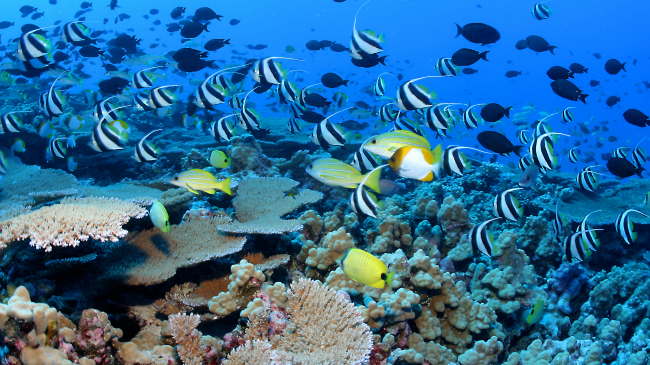Applications to mine the seabed in our ocean commons can be made from 09 July, allowing a few corporations to profit from ecological disaster
By Guy Standing
Sunday 09 July threatens to be a momentous day for the global economy, one that marks the beginning of the biggest gold rush in history, and one that could lead to unprecedented ecological damage. Yet few people seem to be taking much notice. The British government has been silent.
To understand the impending drama, a little history is required. In 1982, after 25 years of torturous negotiations, the United Nations passed UNCLOS (the United Nations Convention on the Law of the Sea). It involved the biggest enclosure in history, turning more than 138m sq km (53m square miles) of seabed into national exclusive economic zones (EEZs) available for exploitation by coastal countries.
But UNCLOS declared that the deep sea outside the EEZs, known as “the Area”, covering 54% of the world’s oceans, was “the common heritage of mankind”. Deep sea mining in the Area was to be banned until a mining code was agreed, which respected the precautionary principle in limiting ecological damage and contained a formula for an equitable sharing of the benefits among all countries of the world.
To draw up such a code, the International Seabed Authority (ISA) was set up in 1994, headquartered in the harbour of Kingston, Jamaica. Because rich countries did not want to give small developing countries power, they insisted that decisions had to be made by consensus. Today, there are 167 member countries, plus the European Union. Unsurprisingly, in the past 28 years, the ISA has failed to produce a mining code or a benefit-sharing mechanism.
In June 2021, the tiny Pacific nation of Nauru, working with a Canadian mining company, triggered an obscure clause in UNCLOS that says that if a country applies to start deep-sea mining in the Area, the ISA has precisely two years to produce a code and sharing mechanism. If not, mining can start. On 9 July, the notice period is up. Legally, applications to mine will start.
To put that into perspective, this will at first open up mining in the 4.5m sq km of sea bed in the Pacific known as the Clarion-Clipperton Zone and, in due course, to the whole of the Area. The deep sea is estimated to contain billions of tons of nickel, cobalt, manganese and other minerals, mainly in potato-sized black nodules, which are seen as essential for a transition to a green terrestrial economy, for use in electric cars, windfarms and other purposes.
Commentators have noted that all the scientific evidence points to huge environmental risks. In a state of alarm, a growing number of countries have demanded a moratorium, as have hundreds of marine scientists. Sadly, this does not include the UK, although rather belatedly the All Party Parliamentary Group for the Ocean met to consider whether it should.
All of us should be deeply alarmed. The environmental impact of deep-sea mining could be catastrophic. Massive machines will scour the ocean bed to pick up polymetallic nodules, destroying everything in their path and creating sediment plumes that can suffocate coral reefs and other organisms hundreds of miles from the mining site. Mining will damage the ocean’s ability to act as a carbon sink, accelerating global warming. And new research suggests the polymetallic nodules could contain radioactive substances, endangering human health.
However, while the environmental issues are rightly receiving most attention, two other aspects have been systematically neglected. A main preoccupation of developing countries in accepting UNCLOS was that benefits from mining should be shared equitably by all countries. At the moment, a few corporations seem en route to a bonanza for which they have no legitimate claim, while the rest of humanity will obtain nothing. The commons belong to us all!
The trouble is compounded by the fact that the ISA is unfit for purpose. It has a wretchedly small annual regular budget of just US$10m, to regulate the world’s deep sea. To supplement its budget, it charges corporations US$500,000 for licences to do exploratory mining. Unsurprisingly, it has not refused any application, and currently 31 such licences have been issued for nearly 1.5m sq km of “exploration”. Five of these are held by China.
Furthermore, much mining is taking place in EEZs, where the ISA has no jurisdiction. And as the ISA does not have the technical capacity or financial resources to do so, it has left corporations to do their own environmental impact assessments, which is like asking the fox to make sure the chickens are safe.
To compound the problem, the ISA has been hubristically supportive of mining. Its secretary general said: “I don’t believe people should worry that much.” He was talking about environmental concerns. But the ISA does not even have an independent scientific council to advise it, just a legal and technical council. And it has marginalised its second obligation, to act as the steward for the global commons by drawing up an equitable formula for sharing benefits among all countries.
In sum, before any deep sea mining is even contemplated, the ISA must be overhauled and the United Nations must revise UNCLOS so that the principles of “the common heritage of humanity” can be resurrected: 09 July should be about more than a moratorium, although that would be a start. Sadly, we should not hold our breath in hope.
SOURCE: THE GUARDIAN/PACNEWS















